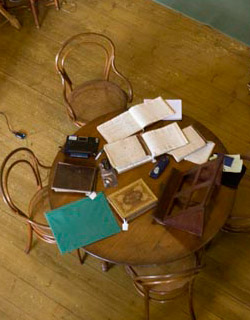// PRESENTATION

The Ajuda Library is one of the oldest in Portugal. The special nature and wealth of its collections characterise it as a heritage library whose mission is to conserve, study and make available its holdings of documents.
The Library has been housed in its own wing of the Ajuda Palace since 10 June 1880. The first three of the five rooms that make up the oldest area of the Library are open to the public. They stand out especially for their size, the height of the shelves and galleries, their furnishings, and the ceilings with frescoes which José Pereira Júnior painted using the trompe-l'oeil technique. Glass cabinets display a selection of documents comprising valuable manuscript and printed works, featuring examples of the Library’s holdings, and a set of 18th/19th centuries artefacts from the former binding workshop of the Royal Library.
The origins of the Ajuda Library go back to the 15th century, when it was known as the Royal Library. Installed since the 16th (?) century in the western tower of the Ribeira Palace, its holdings were significantly augmented by King Dom João V. Most of its very rich collection was lost in the 1755 earthquake, following which it was moved to some houses attached to the wooden palace (known as the “Royal Shed”) in Ajuda.
To escape the threat of the invading French armies, in 1811 the Library was transferred to Brazil, near the Court in Rio de Janeiro, where it formed the initial kernel of what is today the National Library of Rio de Janeiro. In 1821, only the Royal Household manuscripts returned to Portugal, where they were later joined by libraries from the Company of Jesus (from the House of São Roque and the Santo Antão College) and those from the Congregation of the Oratorio and the Necessidades Palace.
The Library was administered directly by the Royal Household until the Proclamation of the Republic in 1910, and its librarians were appointed by the monarch, very often from among the latter’s secretaries – the case of Alexandre Herculano (1839-1877) – or confidants, like Magalhães Coutinho (1877-1895) and Ramalho Ortigão (1895-1911). The first Director appointed under the Republic was Jordão de Freitas (1918-1936).
Since 1910, the Ajuda Library came under the authority of a number of different departments of state with responsibility for Culture. In 2012, the Ajuda Library became a service of the Ajuda Palace which in turn is a dependent department of the Directorate-General for Cultural Heritage.



